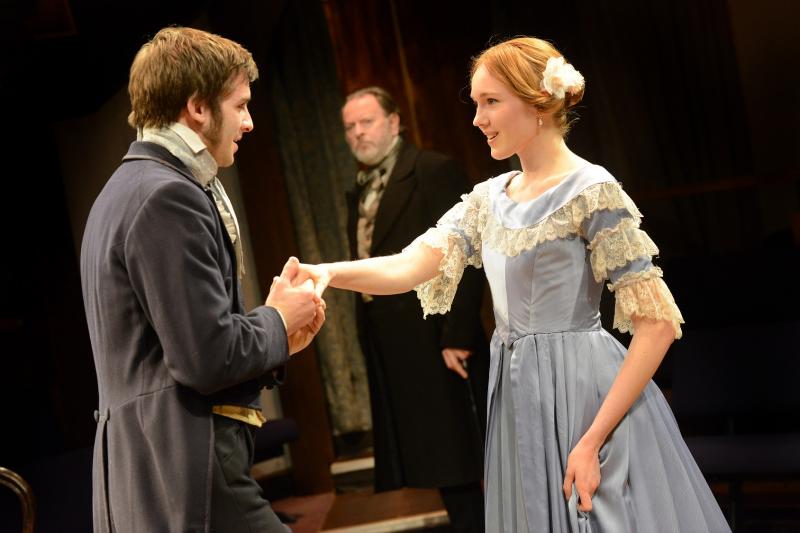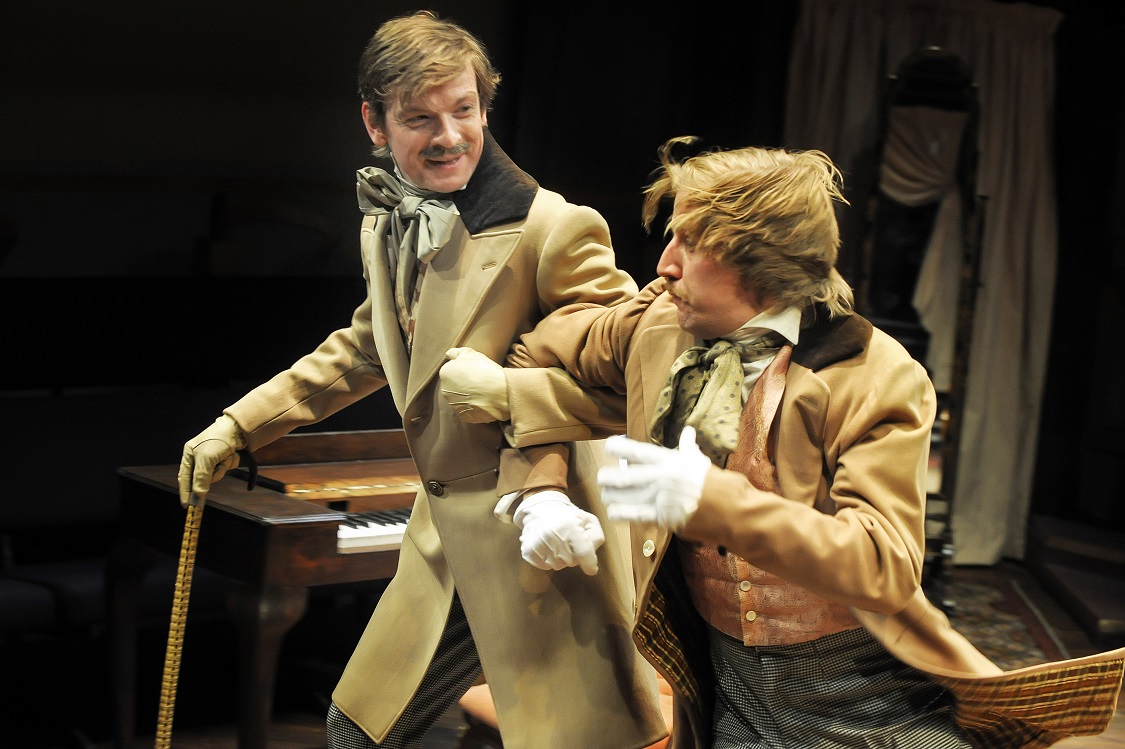The School for Scheming, Orange Tree Theatre | reviews, news & interviews
The School for Scheming, Orange Tree Theatre
The School for Scheming, Orange Tree Theatre
A 19th-century comedy full of witty observations, sly mimicry and sarcastic asides

Usually, to describe a play as "of its time" is a criticism. It is suggestive of drama that hasn't aged well, that doesn't work quite as well for today's audience as it did for the original crowd. First performed in 1847, Dion Boucicault's The School for Scheming seems at first glance to fall into this category, with its mannered language, twisting plot and moral overtones.
But, as this revival demonstrates, pre-emptive assumptions of staleness can be confounded by a production that is all witty observations, sly mimicry and sarcastic asides. As the title would suggest, the action revolves around an educational establishment - a finishing school, at which the unscrupulous Mrs Fox-French instructs her charges in how to secure noble husbands. The young ladies attract a bevy of bizarre suitors, and as one particular family - the Plantagenets - seek an advantageous marriage to fix their debt problems, an intricately-woven plot emerges in which it seems that everyone is either engaged to someone they don't love or else owes them a vast amount of money.
We long for some of that Wildean sparkleDion Boucicault was a prolific, prosperous impressario of the nineteenth century theatrical world. He toured all over, writing, adapting and performing in numerous plays, and like many of the characters he created, making fortunes only to lose them again.
London Assurance, which opened in 1841, was his first big hit. It's also the work for which he is probably best known to today's theatregoers, thanks to a widely-praised production at the National Theatre in 2010 which starred Simon Russell Beale as foppish dandy Sir Harcourt Courtly and Fiona Shaw as the excellently-named Lady Gay Spanker. In an article written for the programme of London Assurance, Boucicault's biographer Richard Fawkes contends that the playwright "bridged the gap" between the work of Congreve, Sheridan and Goldsmith and that of Wilde and Shaw. It's a useful way to think of it - if you imagine something halfway between Mrs Malaprop and Lady Bracknell, you come close to the kind of character at which Boucicault excelled.
In this production of The School for Scheming, director Auriol Smith has made the very sensible decision to keep things firmly rooted in the original text. There has been no attempt to introduce knowing parallels with today's topical issues, and the production is the better for it. The lines about the ephemeral, swindling nature of capitalism are all the more hilarious when the audience is allowed to make the connection to today's City-dwellers for themselves.
 Dominic Hecht (pictured right with Oliver Gomm as Lord Fipley), playing a "speculator" known as The MacDunnum, manages to be funny, despicable and pathetic all at the same time as his machinations take him from impoverished gentility to vast wealth to extreme poverty. In an accomplished cast, Hecht stands out, as does Imogen Sage as heroine Helen Plantaganet. Sage, who is still at drama school, does great things with a difficult role, since Helen has to be as conniving as the rest while still retaining a discernible capacity for redemption.
Dominic Hecht (pictured right with Oliver Gomm as Lord Fipley), playing a "speculator" known as The MacDunnum, manages to be funny, despicable and pathetic all at the same time as his machinations take him from impoverished gentility to vast wealth to extreme poverty. In an accomplished cast, Hecht stands out, as does Imogen Sage as heroine Helen Plantaganet. Sage, who is still at drama school, does great things with a difficult role, since Helen has to be as conniving as the rest while still retaining a discernible capacity for redemption.
The only aspect of this play that does feel like it has gone sour with age is the denouement, in which Victorian moralising about the transformative nature of poverty triumphs over witty speculation. It is here that we long for something of that Wildean sparkle. As Boucicault winds up all his loose ends, we want a sly wink that conveys a sense of mischief managed, that tells us not to take the high-falutin stuff too seriously. As The MacDunnum has it, this play is the product of "an electroplated age - there are figures on top, but it's all humbug beneath".
rating
Explore topics
Share this article
The future of Arts Journalism
You can stop theartsdesk.com closing!
We urgently need financing to survive. Our fundraising drive has thus far raised £49,000 but we need to reach £100,000 or we will be forced to close. Please contribute here: https://gofund.me/c3f6033d
And if you can forward this information to anyone who might assist, we’d be grateful.

Subscribe to theartsdesk.com
Thank you for continuing to read our work on theartsdesk.com. For unlimited access to every article in its entirety, including our archive of more than 15,000 pieces, we're asking for £5 per month or £40 per year. We feel it's a very good deal, and hope you do too.
To take a subscription now simply click here.
And if you're looking for that extra gift for a friend or family member, why not treat them to a theartsdesk.com gift subscription?
more Theatre
 The Producers, Garrick Theatre review - Ve haf vays of making you laugh
You probably know what's coming, but it's such great fun!
The Producers, Garrick Theatre review - Ve haf vays of making you laugh
You probably know what's coming, but it's such great fun!
 Not Your Superwoman, Bush Theatre review - powerful tribute to the plight and perseverance of Black women
Golda Rosheuvel and Letitia Wright excel in a super new play
Not Your Superwoman, Bush Theatre review - powerful tribute to the plight and perseverance of Black women
Golda Rosheuvel and Letitia Wright excel in a super new play
 Cow | Deer, Royal Court review - paradox-rich account of non-human life
Experimental work about nature led by Katie Mitchell is both extraordinary and banal
Cow | Deer, Royal Court review - paradox-rich account of non-human life
Experimental work about nature led by Katie Mitchell is both extraordinary and banal
 Deaf Republic, Royal Court review - beautiful images, shame about the words
Staging of Ukrainian-American Ilya Kaminsky’s anti-war poems is too meta-theatrical
Deaf Republic, Royal Court review - beautiful images, shame about the words
Staging of Ukrainian-American Ilya Kaminsky’s anti-war poems is too meta-theatrical
 Laura Benanti: Nobody Cares, Underbelly Boulevard Soho review - Tony winner makes charming, cheeky London debut
Broadway's acclaimed Cinderella, Louise, and Amalia reaches Soho for a welcome one-night stand
Laura Benanti: Nobody Cares, Underbelly Boulevard Soho review - Tony winner makes charming, cheeky London debut
Broadway's acclaimed Cinderella, Louise, and Amalia reaches Soho for a welcome one-night stand
 The Pitchfork Disney, King's Head Theatre review - blazing with dark energy
Thrilling revival of Philip Ridley’s cult classic confirms its legendary status
The Pitchfork Disney, King's Head Theatre review - blazing with dark energy
Thrilling revival of Philip Ridley’s cult classic confirms its legendary status
 Born with Teeth, Wyndham's Theatre review - electric sparring match between Shakespeare and Marlowe
Rival Elizabethan playwrights in an up-to-the-minute encounter
Born with Teeth, Wyndham's Theatre review - electric sparring match between Shakespeare and Marlowe
Rival Elizabethan playwrights in an up-to-the-minute encounter
 Interview, Riverside Studios review - old media vs new in sparky scrap between generations
Robert Sean Leonard and Paten Hughes make worthy sparring partners
Interview, Riverside Studios review - old media vs new in sparky scrap between generations
Robert Sean Leonard and Paten Hughes make worthy sparring partners
 Fat Ham, RSC, Stratford review - it's Hamlet Jim, but not as we know it
An entertaining, positive and contemporary blast!
Fat Ham, RSC, Stratford review - it's Hamlet Jim, but not as we know it
An entertaining, positive and contemporary blast!
 Juniper Blood, Donmar Warehouse review - where ideas and ideals rule the roost
Mike Bartlett’s new state-of-the-agricultural-nation play is beautifully performed
Juniper Blood, Donmar Warehouse review - where ideas and ideals rule the roost
Mike Bartlett’s new state-of-the-agricultural-nation play is beautifully performed
 The Gathered Leaves, Park Theatre review - dated script lifted by nuanced characterisation
The actors skilfully evoke the claustrophobia of family members trying to fake togetherness
The Gathered Leaves, Park Theatre review - dated script lifted by nuanced characterisation
The actors skilfully evoke the claustrophobia of family members trying to fake togetherness
 As You Like It: A Radical Retelling, Edinburgh International Festival 2025 review - breathtakingly audacious, deeply shocking
A cunning ruse leaves audiences facing their own privilege and complicity in Cliff Cardinal's bold theatrical creation
As You Like It: A Radical Retelling, Edinburgh International Festival 2025 review - breathtakingly audacious, deeply shocking
A cunning ruse leaves audiences facing their own privilege and complicity in Cliff Cardinal's bold theatrical creation

Add comment